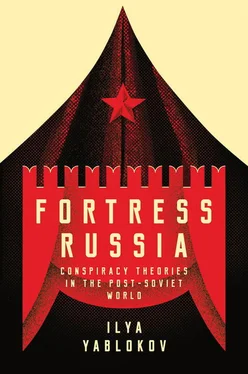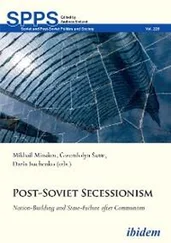The supposed equality of Russia and the West as actors on the global political stage was another important factor in the dissemination of conspiracy theories in Russia. According to Laclau, in populist movements ‘the people’ identify with each other because of the contrasting image of ‘the Other’. It is imperative that these two actors – ‘the people’ and ‘the Other’ – be seen as equals: this is what creates social frontiers and distinguishes ‘the people’ from their enemy, ‘the Other’, which prevents them from achieving their demands. This maintenance of the social environment is achieved by means of a popular, universal demand, what Laclau defines as ‘the elementary form of building-up of the social link’ (2005b, p. 35). In this case, the Kremlin’s demand was the creation of a new national identity of sovereign Russians , which was hard to achieve because of Western resistance. Using a populist form of discourse, Surkov expressed the division of the social sphere into ‘the power’, embodied by the West as a whole, and ‘an underdog’, represented by a sovereign and democratic Russia. In this context, the term ‘sovereignty’ became the empty signifier through which all the demands of the Russian people could be expressed (Laclau, 2005a, pp. 97–9). No matter what the problem, and whether it was experienced by an individual or by a social group in Russia, it would be solved once the nation became sovereign and self-sufficient. It should be noted that Laclau’s theory treated populism as a manifestation of anti-elitist attitudes on the part of ordinary people, who seek to challenge the ruling elites. The case of Surkov’s sovereign democracy proves that populist rhetoric can be used successfully by the elites themselves to reinforce their claim to power.
In fact, Russia’s status as ‘an underdog’ in relation to Europe was further reinforced by Surkov’s critical portrayal of Russia as ‘a badly illuminated outskirt of Europe, but not Europe yet’ (Surkov, 2005). Surkov managed to transform ‘a simple request’ from both political elites and the Russian people for a clear understanding of Russian identity into, to use Laclau’s term, the ‘fighting demand’ of the Russian people to become a nation. He did this by exploiting the belief that certain aspects of Russia were underdeveloped when compared with Europe (Laclau, 2005b, p. 38). The ability to compete with the West in global politics required social mobilization and national unity, which were expressed in Surkov’s concept of a sovereign democracy.
The basis for this ‘demand’ was the notion of Russian greatness and her ability to determine a political agenda in the world, in contrast to the lesser ability of certain other countries in the post-Soviet space to do so:
Russians, the people of Russia, have been a people with a state for 500 years. We are a nation that is used to statehood. Unlike many of our friends from the Soviet Union and plenty of other countries, we always had the idea of the state…. [4]They were provinces of one country, they will become provinces of another. I cannot imagine Russians, people from Russia, who would think like this: ‘Now we shall meld with someone else, we shall run off to them, and they will cuddle us and comfort us and rule over us’. And we have got no one to blame but ourselves for what has happened to us. And we have got nowhere to run, except back home. Here is another – and for me, actually, the most important – reason why Russia should be a self-reliant state that influences world politics. (2010, pp. 103–4)
Pointing at the countries which underwent regime change after the colour revolutions, Surkov inadvertently exposed the neo-imperial character of his model of nation-building. By making European integration a key issue in their political agendas, the leaders of Georgia and Ukraine had posed a serious challenge to Russian dominance in the post-Soviet space. The new political elites of these countries articulated their ambition to join the EU and NATO, which, in turn, for certain sections of the Russian elite, meant the decline of their own influence and an end to plans to restore Russia’s former glory (Tolz, 2001, pp. 238–40). In the 2005 speech, Surkov expressed more bluntly the idea that the former Soviet republics had been dependent on Russia and her policies: ‘They were drawn on the maps by Russian politicians of the past…. We were in the co-creative process, coworking with the world powers to re-arrange the world’ (Surkov, 2005).
The idea of Russian greatness was amplified by the notion that the Russian people were ‘the tireless masters’ of their own fate. Surkov saw ethnic Russians as the core of the nation; they were inherently tolerant and had created a ‘special Russian political culture’ which was aiming at interethnic peace (Surkov, 2006a). Again, this points to the imperial roots of the Russian nation-building model and reiterates some of the ideas developed by the Slavophiles in the nineteenth century. Against this backround, the tragedy of the Soviet collapse, which also destroyed the imperial foundations of Russian statehood, could be given even more emphasis. In fact, the Soviet collapse acquired an important function in defining the political ‘Other’ in domestic politics. The rise of Russian ethnic nationalism in the 2000s (Verkhovsky, 2016) was described by Surkov as a ‘nationalist-isolationist’ issue and an internal threat to Russian territorial integrity. The break-up of the Soviet Union had also been the result of a resurgence of Russian nationalism during Gorbachev’s perestroika :
There was a time when we were told that the Kazakhs, Ukrainians and other comrades were a mill-stone round Russia’s neck…. What was the result? We lost half of the country [in 1991], half of the population, half of the economy, and so forth. And if we believe that today these guys or those guys are to blame for everything, then we shall lose another half of the country and another half of the economy. (Surkov, 2006b)
Surkov was particularly critical of the demand by ethnic Russian nationalists that part of the North Caucasus be separated from the Russian Federation. Linking this to the Soviet collapse gave the political establishment and pro-government intellectuals a powerful tool with which to delegitimize the ideology of the Russian nationalists, who often attacked Putin’s policies as anti-Russian. Nationalists were depicted as a ‘fifth column’ funded by foreign sponsors. The existence of an internal enemy served as one of the main pillars of Surkov’s schema (Surkov, quoted in Kaftan, 2004).
Oligarchs in cahoots with liberals, who were alleged to be working with foreign sponsors, constituted another ‘subversive group’. Labelled as ‘radicals’, who would normally inhabit ‘the fringes of democracy’, this group was portrayed as the second main threat to the democratic development of Russia (Surkov, 2006a). The main danger of these critics was their ‘malign corruption’ of national values; they achieved this by depicting Russia as an inefficient state; this caused internal conflict and opened the way for a ‘soft takeover’ ( miagkoe pogloshchenie ) by foreign countries:
The methods of the Orange Revolution show that very clearly. I cannot say that this is no longer an issue, because if they managed to do it in four countries, then why not in a fifth? I do not think these attempts will be limited to 2007 and 2008. Our foreign friends could somehow try to repeat them in the future…. There is one real medicine here – to create a nationally-oriented class in Russian society. (Surkov, 2010, p. 108)
The various internal and external political actors referred to in Surkov’s speeches were used to form the category of the ‘Other’, who was involved in conspiracy against the Russian nation. The use of the word ‘foreign’ ( inozemnyi ) in the above quotation served to further alienate the West in Russians’ eyes. This argument, as we shall see, provided pro-Putin politicians and intellectuals with a tool with which to neutralize opposing political views.
Читать дальше
Конец ознакомительного отрывка
Купить книгу












